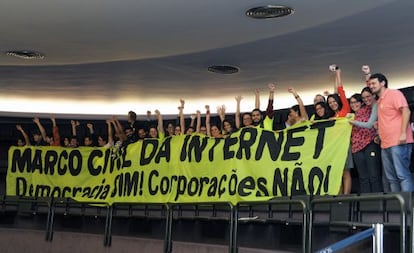Brazil passes far-reaching internet law
Bill to be signed by Rousseff establishes rules for providers and guarantees for users

In a unanimous decision, Brazil’s Senate on Tuesday passed groundbreaking legislation that establishes guidelines, guarantees and rights for the country’s internet users.
With this new law, Brazil has become the first country in the world to outline regulations and guarantee privacy for people who use the internet. President Dilma Rousseff is expected to sign the bill into law this week.
The legislation comes in the wake of last year’s revelations made by former National Security Agency (NSA) contractor Edward J. Snowden that the United States had been spying on millions of Brazilians by employing local telecoms to monitor their phone conversations and internet connections.
Rousseff and her Cabinet members were also targets, according to documents provided by Snowden, who is wanted by the United States on espionage charges. The disclosure soured US-Brazilian relations and prompted Rousseff to cancel what would have been her first official visit to Washington last October. Snowden also accused the US of spying on German Chancellor Angela Merkel and other European leaders.
Internet providers will be obligated to keep information on customer usage for up to six months
The new law states that providers cannot limit access to any content or charge customers different prices for the access they offer (a concept known as net neutrality). Internet providers must keep information on customer usage for six months, and will be obligated to turn that data over to authorities with a court order. At the same time, the bill also says that companies such as Facebook and Google will be subject to Brazilian laws when it comes to local disputes.
British physicist and World Wide Web inventor Tim Berners-Lee has called the law the first “Internet Constitution” because it balances the rights and duties of users, governments and corporations while ensuring the internet will continue to be an open network.
Berners-Lee is expected to attend #NETmundial, an international meeting that gets underway on Thursday in São Paulo, where the future of the internet will be discussed. The Brazilian president is also expected to inaugurate the meeting.
But not everyone is in favor of the new law. Sergio Amadeu, a sociologist who was a spokesman for civil society in the special committee that drafted the legislation, has called on the president to veto part of the bill that obligates providers to keep data for a certain period of time because, according to him, it violates certain guarantees. Pedro Eckman, coordinator for a social network platform that oversees the rights of internet users, also stated that the law invades the privacy of ordinary citizens because of the storage-of-data requirement.
Tu suscripción se está usando en otro dispositivo
¿Quieres añadir otro usuario a tu suscripción?
Si continúas leyendo en este dispositivo, no se podrá leer en el otro.
FlechaTu suscripción se está usando en otro dispositivo y solo puedes acceder a EL PAÍS desde un dispositivo a la vez.
Si quieres compartir tu cuenta, cambia tu suscripción a la modalidad Premium, así podrás añadir otro usuario. Cada uno accederá con su propia cuenta de email, lo que os permitirá personalizar vuestra experiencia en EL PAÍS.
¿Tienes una suscripción de empresa? Accede aquí para contratar más cuentas.
En el caso de no saber quién está usando tu cuenta, te recomendamos cambiar tu contraseña aquí.
Si decides continuar compartiendo tu cuenta, este mensaje se mostrará en tu dispositivo y en el de la otra persona que está usando tu cuenta de forma indefinida, afectando a tu experiencia de lectura. Puedes consultar aquí los términos y condiciones de la suscripción digital.








































